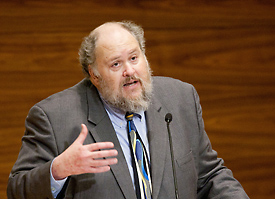While universities and their faculty must diligently protect academic freedom, so too must they self-police those colleagues whose extreme actions ultimately could undermine that freedom, a University of Houston legal scholar said.
Michael Olivas on Oct. 11 delivered the University Senate’s 20th annual Davis, Markert, Nickerson Lecture on Academic and Intellectual Freedom, speaking on “God, Grades and Sex: The Developing Law of the College Classroom.”

Michael Olivas delivers the 20th annual Davis, Markert, Nickerson Lecture on Academic and Intellectual Freedom. Photo by Scott Soderberg, U-M Photo Services.
He cited a variety of cases where students sued their professors over conflicts involving matters of religion, grading or sexual references, and cautioned that faculty need to understand how they can reduce the likelihood that such disputes may erode their academic freedom.
“If colleges do not police themselves, others will,” said Olivas, the William B. Bates Distinguished Chair in Law at the University of Houston Law Center. “Disputes between teachers and pupils are on the rise, and poor fact patterns and sloppy practices will lead inevitably to substantial external control over the classroom.”
While faculty generally have wide-ranging discretion to undertake research and formulate teaching methods, that autonomy is “highly contingent upon traditional norms of peer review, codes of ethical behavior and institutional standards,” he said.
For instance, taking a student’s arms and moving them around may be appropriate in a physical education class, but not so in one dealing with legal evidence. Discussions of sexuality that seem salacious in an ethics course could be central to a human sexuality seminar.
“In short, academic freedom doesn’t give carte blanche to professors, but rather vests the faculty with enforcing standards of behavior to be reasonably and appropriately applied in evaluations,” Olivas said.
“It is important that we teach our junior faculty what the appropriate norms are if you start hearing distressing signals from students; to correct senior faculty who may have gotten out of touch on these issues. If we don’t do it, who will? I assure you there are people who will move into the breach, and they are not the ones we want to be correcting ourselves, judging ourselves, evaluating ourselves.”
Seated in the front row of Blau Auditorium at the Stephen M. Ross School of Business was H. Chandler Davis, the sole surviving member of the trio for whom the academic freedom lecture is named.
Davis, along with Clement Markert and Mark Nickerson, was on the U-M faculty in 1954, when all three were called to testify before the House Un-American Activities Committee. They invoked their constitutional rights and refused to answer committee questions about their political associations. The three were suspended and Nickerson was denied the summer portion of his fiscal year salary. Markert ultimately was reinstated; Nickerson, a tenured professor, and Davis were dismissed from the university.
Olivas said that challenges to academic freedom — then and now — represent an assault on faculty everywhere, “and we all ought to rise up when they threaten any of our colleagues.”
“If they’re under assault, all of us are under assault. When Professor Davis was under assault, the entire faculty was under assault and it shouldn’t take us 50 years later to see that.”

